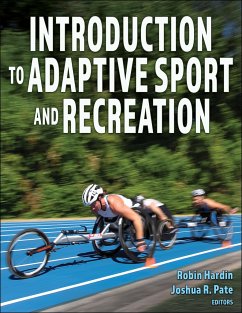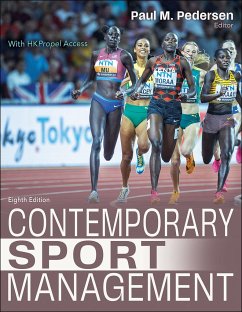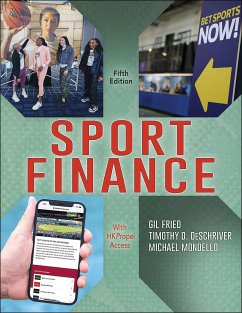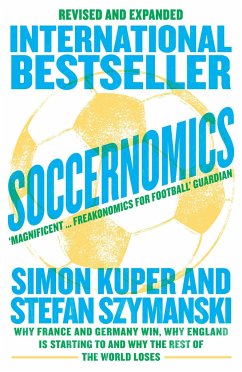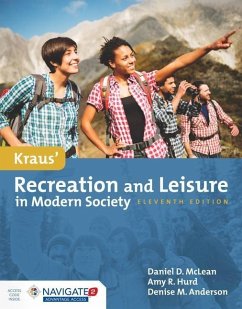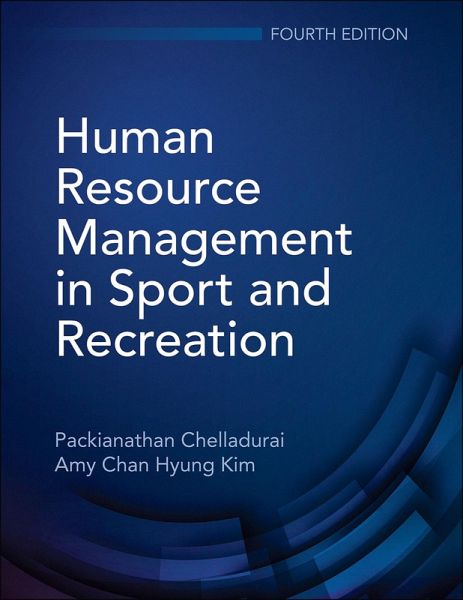
Human Resource Management in Sport and Recreation
Versandkostenfrei!
Versandfertig in 2-4 Wochen

PAYBACK Punkte
64 °P sammeln!




An authoritative guide offering a holistic view of human resource management in sport and recreation organizations. It integrates robust research with practical case studies that address diversity, crisis response, legal challenges, and the roles of professionals, volunteers, and clients.
Packianathan Chelladurai, PhD, is a distinguished professor in the School of Hospitality, Sport, and Tourism Management at Troy University in Troy, Alabama. Widely recognized as a leader in the field of sport management, Dr. Chelladurai has taught human resource management in sport and recreation for the past 40 years in both Canada and the United States. He is the author of six books, including Sport Management: Macro Perspectives , which was the first book to apply organizational theory to sport management. He has also written more than 115 journal articles and 39 book chapters. His writings on leadership and decision making are particularly well known; perhaps best known are his Multidimensional Model of Leadership and the Leadership Scale for Sports (LSS), which has been translated into more than 15 languages. In 1991, he served as editor of the Journal of Sport Management. He is a founding member of the North American Society for Sport Management (NASSM) and the European Association for Sport Management (EASM). He is a long-standing member of the prestigious National Academy of Kinesiology. Dr. Chelladurai received an MASc and a PhD in management science from the University of Waterloo. In 1990, the American Academy of Kinesiology and Physical Education elected him as a corresponding fellow of the academy. In 1991, he was the first recipient of NASSM’s most prestigious honor, the Earle F. Zeigler Award. In 2005, the EASM bestowed on him its first-ever Award of Merit for Distinguished Services to Sport Management Education. In 2015, the EASM named its most prestigious award after Dr. Chelladurai; it is known as the EASM Chelladurai Award, and he was the recipient of that award in that year. Amy Chan Hyung Kim, PhD, is an associate professor in the department of sport management at Florida State University. Dr. Kim has taught various courses for undergraduate, masters, and PhD students, including Human Resource Management, Facility and Event Management, Introduction to Sport Management, Strategic Management, and Research Methods in Sport Management. Her research focuses on promoting sport for mental health from a social epidemiological perspective for underrepresented populations such as older adults. She has been invited to conduct social, psychological, and economic impact assessments for several organizations and local government sectors. Her work has been published both in top-tier sport management journals and in highly impactful journals outside of the field. She also is the coauthor of the book Research Methods in Sport Management. Dr. Kim earned her PhD and master’s degree from The Ohio State University and her bachelor’s degree from Yonsei University in South Korea.
Produktdetails
- Verlag: Human Kinetics Publishers
- Fourth Edition
- Seitenzahl: 424
- Erscheinungstermin: 2. Mai 2022
- Englisch
- Abmessung: 278mm x 214mm x 28mm
- Gewicht: 1206g
- ISBN-13: 9781718210028
- ISBN-10: 1718210027
- Artikelnr.: 63197880
Herstellerkennzeichnung
Libri GmbH
Europaallee 1
36244 Bad Hersfeld
gpsr@libri.de
Für dieses Produkt wurde noch keine Bewertung abgegeben. Wir würden uns sehr freuen, wenn du die erste Bewertung schreibst!
Eine Bewertung schreiben
Eine Bewertung schreiben
Andere Kunden interessierten sich für


